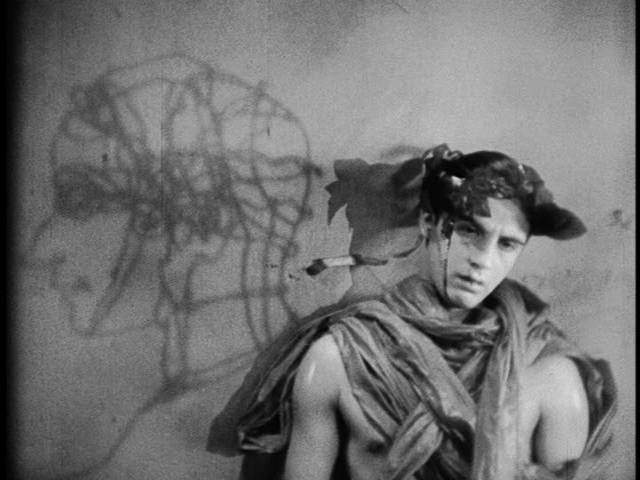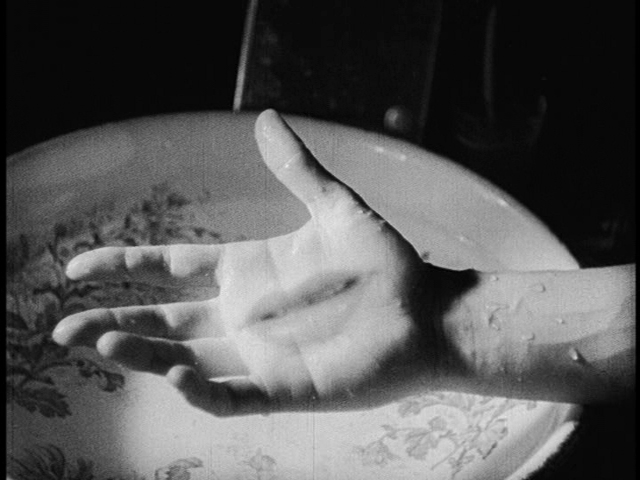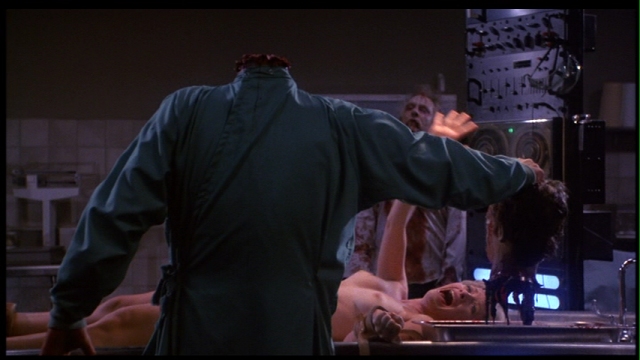
Her Eminence, the Lady Sonya Taaffe of the Snow Shovel Campaign, has requested that I discuss three movies which I recently have viewed; The Blood of a Poet, Orpheus, and Re-Animator. One of these things is not like the others.
I'd seen all three of these movies before*, though so long ago that my memory wasn't so great. Now I have all three on DVD, and that's good because they're good movies. Well, maybe I could've lived without Re-Animator, but when I saw it in the store packaged with a highlighter that looks like a syringe, I couldn't resist.
But let's go alphabetically here;

The Blood of a Poet (Le sang d'un poète)
1930 Directed by Jean Cocteau
It's a commentary on artists, and what it means to be an artist, that really speaks for itself rather eloquently. It's a film that uses bizarre imagery to communicate things otherwise incommunicable. Possibly it was the most experimental cinematic narrative up to that point--my own limited experience with movies and the loss of thousands of movies made before 1930 prevent me from knowing. But The Blood of the Poet's unbridled surrealism certainly surpassed in its strangeness the works of Fritz Lang and the German expressionist filmmakers of the time.

A poet accidentally acquires a living, human-like mouth on his palm. When placed under water, air bubbles emerge from the mouth. He can't seem to get rid of the mouth, wiping it on various surfaces, until his hand covers the mouth of a statue resembling the Venus de Milo. The narrator warns against the danger of giving the mouth to a statue, which then comes alive, effectively becoming the poet's muse, and he seems greatly relieved to have invested his talent in the creature.
The statue leads him through a mirror into a hall with a series of doors. Through each keyhole, he sees a different scene of human strife play out, each seemingly without connexion to our protagonist, though entry through the mirror implies that these are things he nonetheless has at least a keyhole sized perspective on. So Cocteau rather wonderfully addresses the poet's ability to connect with the humanity of people in wildly different situations. It's a nice shade of the "write what you know" philosophy.

The poet eventually seems to become a highly regarded individual, perhaps a muse himself. He goes from living in a humble flat at the beginning of the movie, to wearing a tuxedo while playing cards with his statue muse. Opera house balconies filled with aristocrats watching the seemingly perilous game suggest the poet's now become an institution, yet death, in the form of a gun the muse twice makes him use on himself, seems always a waiting consequence of his art. First the gun gives him laurels, then it just gives him death.

Orpheus (Orphée)
1949 Directed by Jean Cocteau
In a more traditional narrative of characters and situations, this modern re-telling of the Orpheus myth also deals with the poet's relationship to death. In his most significant departure from the original myth, Cocteau casts death as an aloof, beautiful woman, who captures the attentions of Orpheus, diverting them from his wife and nearly all other things.

Orpheus is played by the absurdly handsome Jean Marais as a nationally renowned poet at odds with a new generation of poets. Yet the death of one member of that latter group seems to fill Orpheus with an obsessive inspiration. It marks the beginning of a path for Orpheus to explore death and seek to know it; appropriately mirrors are again used as gateways.
I'm still a little unsure about the ending, which diverts from the myth, seeing an Orpheus happily settling into life with Eurydice. I am feeling a bit dim to-day, so maybe I'll come back to it . . .
Oh, once again, I spotted something Francis Ford Coppola took from Cocteau for his Dracula movie;

This is a trick shot where actors scooting across a floor on their backs are shot from above to make it appear as though they're standing against a wall. Then, when they turn an obtuse angled corner, they find themselves apparently somehow falling sideways. In Orpheus, this is to convey the strange physics of the underworld. In Dracula, it happens to John Harker as he's escaping from Dracula's castle. It makes a lot less sense in the latter film, sure, but whatever. It's still a good movie.

Re-Animator
1985 Directed by Stuart Gordon
However, the fact that the opening title sequence of this film blatantly steals the score from Alfred Hitchcock's Psycho comes across less as an interesting homage than as wholesale theft. There's no individual "Re-Animator" feeling created with the opening credits. It just made me think, "Oh, it's the Psycho soundtrack. Why?"
In an interview included on the DVD, Re-Animator composer Richard Brand claims his use of the Psycho music was intentional, that it was meant to be "quirky." He maintains that, among everyone working on the film, he was the only one who recognised, from rough cuts, that the film was so over the top that it ought to be presented as a horror movie parody, and to do that he needed to use an iconic horror movie score. He says that it was an accident that no credit was given to Bernard Herrmann originally, and Brand says he personally made sure credit was put in later prints.
That's right--Richard Brand is full of shit.

Still, the movie is good, schlocky fun. Perhaps that's appropriate since H.P. Lovecraft wrote the original story as a parody of Frankenstein, now the movie is a parody of zombie movies. But there is a sincerity in it, too, notably in the form of Jeffery Combs, who plays Herbert West with wonderful zeal.
It's well this movie is so enthusiastically phoney, though, as it allows us to enjoy the gratuitousness;

These things happen.
The special effects are top notch, and most of the budget clearly went to exploding eyeballs and fake limbs, thereby confining the action to four or five rather plain looking sets, inhabited by no more than seven or eight people at any one time.
I can't help wondering how Herbert West would do on an introspective journey through the underworld . . .

When hunting zombie cats, bring your croquet mallet.
*Previously, I'd seen only all but the last fifteen or so minutes of Orpheus. Sonya urged me to rectify this, and she is wise.

No comments:
Post a Comment